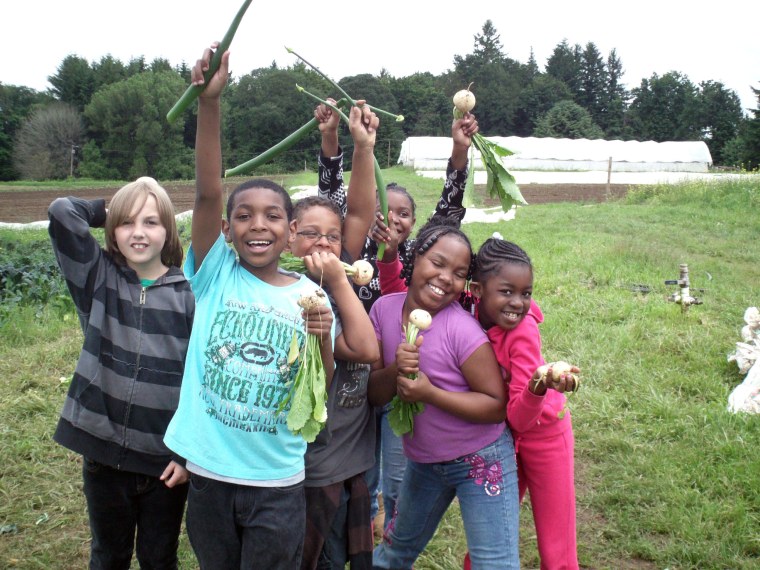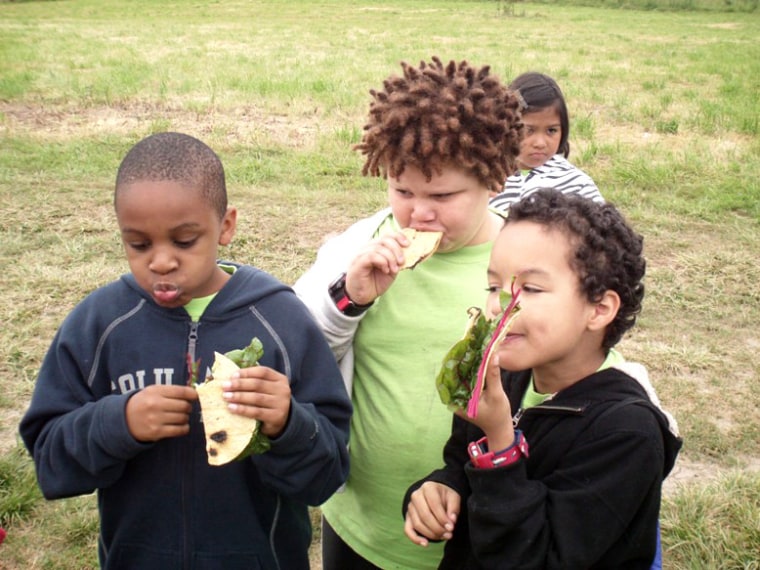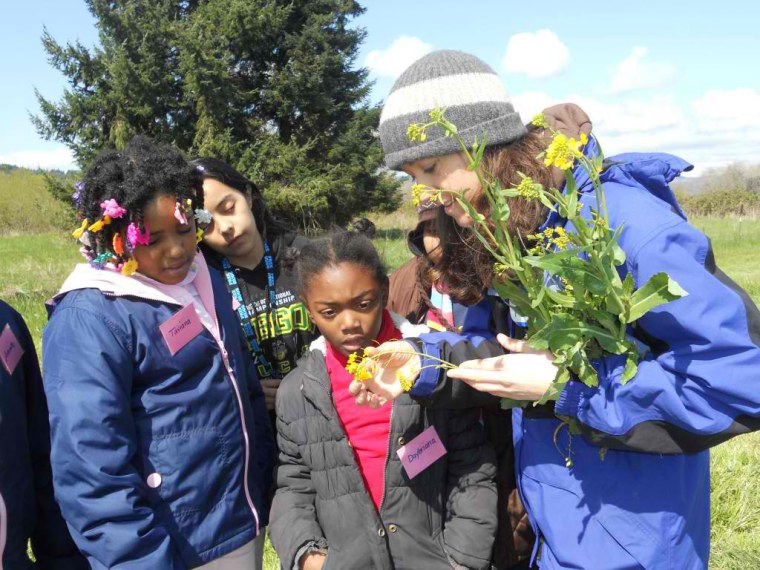
I recently learned of an educational program in Portland, Ore., that takes school kids, mostly from underserved districts, to a small but bustling organic vegetable farm, and teaches them the beauty of raising and eating (mostly eating) vegetables. The program is a runaway success, and could very well be a better grassroots way to stimulate positive dietary practices than any of the more sensational approaches, from Morgan Spurlock's "Super Size Me" documentary to Jamie Oliver's school-lunch makeover TV crusade.
School trips to farms aren't new. I grew up in Indiana, surrounded by cows, corn and combines. Where else were we going to go on a field trip? I remember a chicken farm. Not the sights or the sounds, though. The smell. Walking into the great hall where the hens laid their eggs, I was instantly caught in the embrace of a musky yet astringent cloud of malodor. Gripping at my nose with both hands, I still couldn't keep it out. Sweat poured from my face, tears ran from my eyes. My trip to the chicken farm didn't make me appreciate chickens more, and grossed me out on the eggs I had previously savored. It was something from which I had to recover.
But kids who visit the Sauvie Island Center don't leave reeling with the horrors of kale and tomato and turnip. No, having harvested it themselves, and used their haul to prepare a field lunch that could involve anything from salads to pesto dips to quesadillas, these kids are suddenly realizing that the vegetables on their dinner plates all their lives are actually quite tasty.

"The Jamie Oliver shows are a little extreme, but many of the kids who come out there have never been to a vegetable farm," Sauvie Island Center executive director Anna Goldrich told me. "Lots of kids don't think they like vegetables."
When the field trip arrives, they go around a circle asking each child what their favorite vegetable is. "A lot of kids couldn't think of a vegetable that they liked." Goldrich said that this is not a socioeconomic thing either. She sees the same fear of vegetables — "lachanophobia," according to the Internet — in kids from the highest-income school districts.
But good things happen when you take these kids out of their environment, Goldrich said. By giving them a treasure hunt to locate a vegetable growing in the middle of a field, letting them pick it and then eat it, rather than getting it served to them, overcooked, on a plate by their parents, they generally respond with enthusiasm.
"They'll try almost anything if they can pick it out of the field and pop it in their mouth," said Goldrich. "They almost always try it, and they'll like most things, if not everything."
The Center is a nonprofit that works in collaboration with Portland's regional government, known as Metro, and the Sauvie Island Organics farm, located on 16 acres of a 120-acre park.
Back in 2005, the farm's owner teamed with James Beard Award-winning chef Cory Schreiber, founder of Portland's renowned Wildwood restaurant. Together they worked with public school teachers to create a curriculum, and began raising funds — including a grant from Microsoft billionaire Paul Allen — to achieve the vision of a quality educational experience for school kids.

In 2008, the farm hosted 300 kids throughout the year. By last year, the number had jumped to 1,100. Thanks to the outside funding, 60 percent of the trips to the farm bring kids from lower-income schools, where the cost of bus and staffing are covered.
The farm serves local restaurants and about 500 families who subscribe to get a box of assorted veggies every week. "Each week the farm will tell us where we can eat," said Goldrich. "Fall is awesome; everything is there … kale, turnips, carrots, tomatoes."
But because of the weird weather of late, there isn't always a bountiful harvest awaiting the school kids. Not long ago, the farm, lacking other options, directed the visitors to some brussels sprouts and collard greens that had lasted through the winter, instead of having been cut down. As luck would have it, the extra time in the field made the collards sweeter than usual. Instead of being grossed out by the bitterness, the kids couldn't get enough of them — raw. (Ordinarily they're only good when cooked for ages.)
Getting kids to eat their greens. That's a tough assignment for Mr. T, let alone a one-day school field trip program. But the results Goldrich sees give her reason for optimism. "We hope the experience will open their mind to eating more vegetables in the future," she said. "Maybe they'll be at the farmer's market, and say, 'Hey, that's kale, like we tried on the farm.' "
And no, the farm doesn't have any chickens. I checked.
Find out more about the Sauvie Island Center on its website (there's even a link for donations, if you want to help out). You can also follow it on Facebook.
Previously from Wilson Rothman:
- Man meets meat: Joining the butchering trend, knife-first
- Adventures in babyfooding: How I learned from failure
- A survival guide for royal wedding widowers
Wilson is the deputy tech and science editor for msnbc.com and TODAY.com. You can catch up with him on Twitter at @wjrothman.